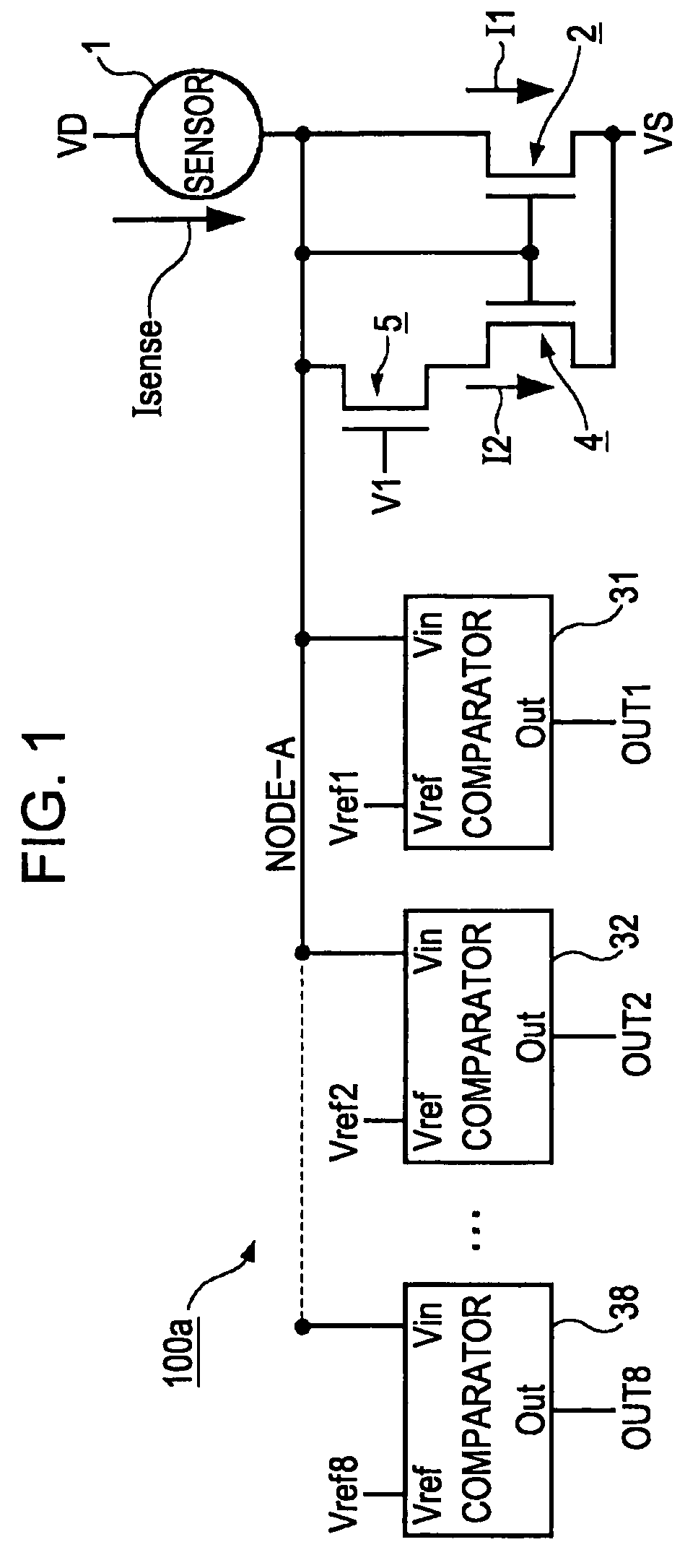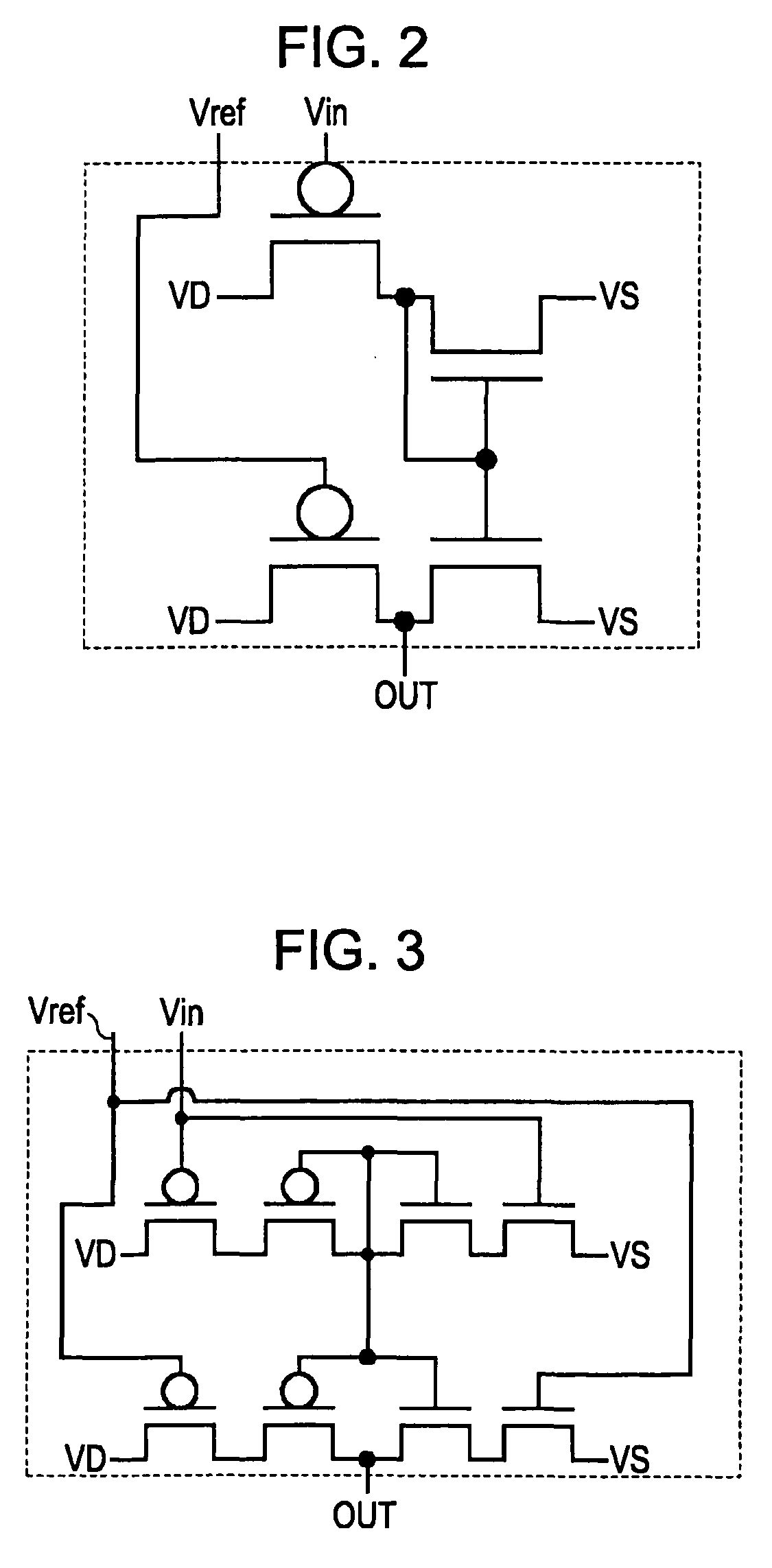Electronic circuit, electro-optical device, and electronic apparatus including the same
a technology of electrooptical devices and electronic devices, applied in the direction of optical radiation measurement, radiation control devices, instruments, etc., can solve the problems of reducing the dynamic range where a/d conversion is possible, poor saturation characteristics of polysilicon thin-film transistors, and reducing the flexibility of sensor arrangement, so as to improve the freedom of sensor arrangement and display quality. , the effect of reducing the cos
- Summary
- Abstract
- Description
- Claims
- Application Information
AI Technical Summary
Benefits of technology
Problems solved by technology
Method used
Image
Examples
first embodiment
[0071]FIG. 1 is a diagram showing a sensor 1 and an A / D conversion circuit 100a (electronic circuit) realizing an electronic circuit in accordance with a first embodiment of the present invention. Elements that are the same as those of the known structure shown in FIG. 11 are designated by the same reference numerals, and a description thereof is omitted. Referring to FIG. 1, a transistor 2 (first transistor), a transistor 4 (second transistor), a transistor 5 (control circuit), and transistors constituting comparator circuits 31 to 38 are field-effect transistors each including an active layer made of thin-film polysilicon disposed on a glass substrate (substrate).
[0072]The transistor 2, the transistor 4, and the transistor 5 constitute a current-voltage conversion circuit that converts a current into a voltage. The transistor 4 and the transistor 5 constitute a range-switching circuit that switches the current-voltage conversion range (measurement range) of the current-voltage con...
second embodiment
[0094]FIG. 9 is a circuit diagram showing a sensor 1 and an A / D conversion circuit 100b according to a second embodiment of the invention. Referring to FIG. 9, a transistor 2, a transistor 4, a transistor 15, and a transistor 16 constitute a current-voltage conversion circuit that converts a current into a voltage. The transistor 4, the transistor 15, and the transistor 16 constitute a range-switching circuit that switches the current-voltage conversion range of the current-voltage conversion circuit.
[0095]The transistor 4 is disposed in parallel to the transistor 2, a drain electrode being connected to a Node-A, a source electrode being connected to a power supply voltage VS. A gate electrode of the transistor 4 is connected via the transistor 15 to the Node-A, and connected via the transistor 16 to the power supply voltage VS. A range-switching signal V1 is input into a gate electrode of the transistor 15, and a signal XV1 is input into a gate electrode of the transistor 16.
[0096]...
third embodiment
[0103]FIG. 10 is a circuit diagram showing a sensor 1 and an A / D conversion circuit 100c according to a third embodiment of the invention. Referring to FIG. 10, a transistor 2, a transistor 4, a transistor 8, a transistor 5, and a transistor 7 constitute a current-voltage conversion circuit that converts a current into a voltage. The transistor 4, the transistor 8, the transistor 5, and the transistor 7 constitute a range-switching circuit that switches the current-voltage conversion range of the current-voltage conversion circuit.
[0104]A gate electrode of each of the transistors 2, 4, and 8 is connected to a Node-A, and a source electrode of each of the transistors 2, 4, and 8 is connected to a power supply voltage VS. A drain electrode of the transistor 4 is connected via the transistor 5 to the Node-A, and a drain electrode of the transistor 8 is connected via the transistor 7 to the Node-A. A first range-switching signal V1 is input to the gate electrode of the transistor 5, and...
PUM
| Property | Measurement | Unit |
|---|---|---|
| length | aaaaa | aaaaa |
| width | aaaaa | aaaaa |
| thickness | aaaaa | aaaaa |
Abstract
Description
Claims
Application Information
 Login to View More
Login to View More - R&D
- Intellectual Property
- Life Sciences
- Materials
- Tech Scout
- Unparalleled Data Quality
- Higher Quality Content
- 60% Fewer Hallucinations
Browse by: Latest US Patents, China's latest patents, Technical Efficacy Thesaurus, Application Domain, Technology Topic, Popular Technical Reports.
© 2025 PatSnap. All rights reserved.Legal|Privacy policy|Modern Slavery Act Transparency Statement|Sitemap|About US| Contact US: help@patsnap.com



